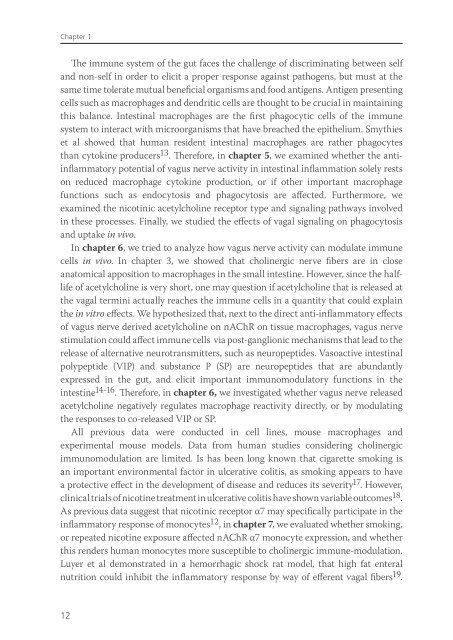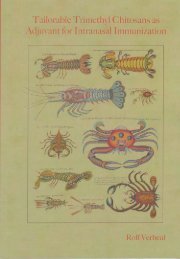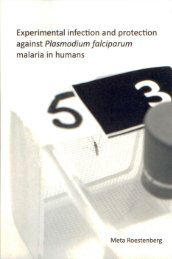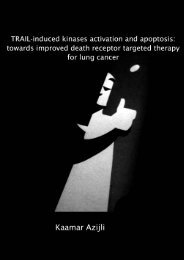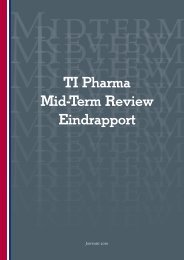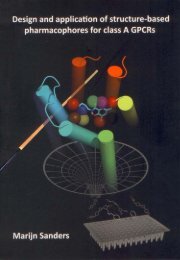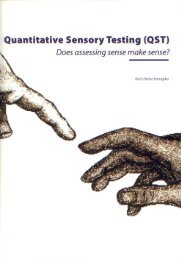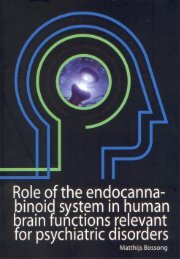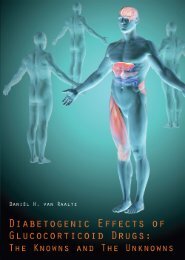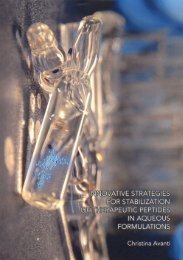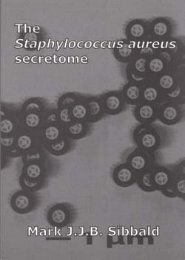The vagus nerve as a modulator of intestinal inflammation - TI Pharma
The vagus nerve as a modulator of intestinal inflammation - TI Pharma
The vagus nerve as a modulator of intestinal inflammation - TI Pharma
Create successful ePaper yourself
Turn your PDF publications into a flip-book with our unique Google optimized e-Paper software.
Chapter 1<br />
<strong>The</strong> immune system <strong>of</strong> the gut faces the challenge <strong>of</strong> discriminating between self<br />
and non-self in order to elicit a proper response against pathogens, but must at the<br />
same time tolerate mutual beneficial organisms and food antigens. Antigen presenting<br />
cells such <strong>as</strong> macrophages and dendritic cells are thought to be crucial in maintaining<br />
this balance. Intestinal macrophages are the first phagocytic cells <strong>of</strong> the immune<br />
system to interact with microorganisms that have breached the epithelium. Smythies<br />
et al showed that human resident <strong>intestinal</strong> macrophages are rather phagocytes<br />
than cytokine producers 13 . <strong>The</strong>refore, in chapter 5, we examined whether the antiinflammatory<br />
potential <strong>of</strong> <strong>vagus</strong> <strong>nerve</strong> activity in <strong>intestinal</strong> <strong>inflammation</strong> solely rests<br />
on reduced macrophage cytokine production, or if other important macrophage<br />
functions such <strong>as</strong> endocytosis and phagocytosis are affected. Furthermore, we<br />
examined the nicotinic acetylcholine receptor type and signaling pathways involved<br />
in these processes. Finally, we studied the effects <strong>of</strong> vagal signaling on phagocytosis<br />
and uptake in vivo.<br />
In chapter 6, we tried to analyze how <strong>vagus</strong> <strong>nerve</strong> activity can modulate immune<br />
cells in vivo. In chapter 3, we showed that cholinergic <strong>nerve</strong> fibers are in close<br />
anatomical apposition to macrophages in the small intestine. However, since the halflife<br />
<strong>of</strong> acetylcholine is very short, one may question if acetylcholine that is rele<strong>as</strong>ed at<br />
the vagal termini actually reaches the immune cells in a quantity that could explain<br />
the in vitro effects. We hypothesized that, next to the direct anti-inflammatory effects<br />
<strong>of</strong> <strong>vagus</strong> <strong>nerve</strong> derived acetylcholine on nAChR on tissue macrophages, <strong>vagus</strong> <strong>nerve</strong><br />
stimulation could affect immune cells via post-ganglionic mechanisms that lead to the<br />
rele<strong>as</strong>e <strong>of</strong> alternative neurotransmitters, such <strong>as</strong> neuropeptides. V<strong>as</strong>oactive <strong>intestinal</strong><br />
polypeptide (VIP) and substance P (SP) are neuropeptides that are abundantly<br />
expressed in the gut, and elicit important immuno<strong>modulator</strong>y functions in the<br />
intestine 14-16 . <strong>The</strong>refore, in chapter 6, we investigated whether <strong>vagus</strong> <strong>nerve</strong> rele<strong>as</strong>ed<br />
acetylcholine negatively regulates macrophage reactivity directly, or by modulating<br />
the responses to co-rele<strong>as</strong>ed VIP or SP.<br />
All previous data were conducted in cell lines, mouse macrophages and<br />
experimental mouse models. Data from human studies considering cholinergic<br />
immunomodulation are limited. Is h<strong>as</strong> been long known that cigarette smoking is<br />
an important environmental factor in ulcerative colitis, <strong>as</strong> smoking appears to have<br />
a protective effect in the development <strong>of</strong> dise<strong>as</strong>e and reduces its severity 17 . However,<br />
clinical trials <strong>of</strong> nicotine treatment in ulcerative colitis have shown variable outcomes 18 .<br />
As previous data suggest that nicotinic receptor α7 may specifically participate in the<br />
inflammatory response <strong>of</strong> monocytes 12 , in chapter 7, we evaluated whether smoking,<br />
or repeated nicotine exposure affected nAChR α7 monocyte expression, and whether<br />
this renders human monocytes more susceptible to cholinergic immune-modulation.<br />
Luyer et al demonstrated in a hemorrhagic shock rat model, that high fat enteral<br />
nutrition could inhibit the inflammatory response by way <strong>of</strong> efferent vagal fibers 19 .<br />
12


